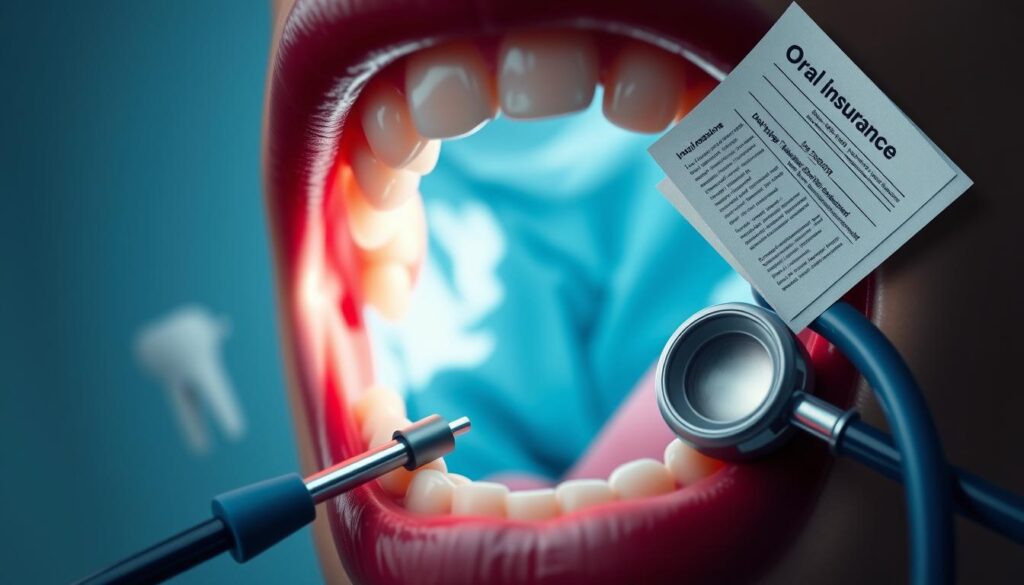Are you worried about the cost of an upcoming oral surgery? Understanding health insurance and dental coverage can be tough. But don’t worry, this guide will help you find the answers you need.
This article will help you understand oral surgery procedures and insurance coverage. You’ll learn about medical and dental insurance and what they cover. Get ready to explore the details of this important healthcare topic.
Key Takeaways
- Explore the various types of oral surgical procedures and their potential insurance coverage
- Understand the differences between medical and dental insurance when it comes to oral surgery
- Learn about the pre-authorization requirements and documentation needed for insurance claims
- Discover the types of oral surgeries typically covered by health insurance plans
- Gain insights into the coverage for wisdom teeth removal, jaw surgery, and dental implants
Understanding Oral Surgery and Insurance Basics

Dealing with oral surgery and insurance can be tough. But knowing the difference between dental and medical insurance helps. Also, understanding the types of oral surgery procedures is key to making smart health choices.
Types of Oral Surgical Procedures
Oral surgery includes many procedures, from simple extractions to complex jaw realignment and TMJ surgery. Here are some common ones:
- Wisdom teeth removal
- Dental implant placement
- Corrective jaw surgery (orthognathic surgery)
- Treatment for temporomandibular joint (TMJ) disorders
- Biopsies and removal of oral lesions or tumors
Difference Between Medical and Dental Insurance Coverage
Medical and dental insurance cover different things. Medical insurance covers medically necessary procedures, like jaw surgery after an accident. Dental insurance usually covers routine care, like cleanings and fillings.
Pre-authorization Requirements
Many insurance plans need approval for certain surgeries. This means you must get okay from your insurance before the surgery. It ensures the surgery is needed and covered. Knowing this can save you from surprise costs.
| Dental Insurance Plans | Typical Coverage Limits |
|---|---|
| PPO (Preferred Provider Organization) | $1,000 – $2,000 per year |
| HMO (Health Maintenance Organization) | $500 – $1,500 per year |
| Indemnity Plans | Vary based on plan, but generally higher than PPO and HMO |
Knowing about oral surgery and insurance is crucial. It helps you get the care you need without breaking the bank. By understanding procedures, insurance differences, and pre-authorization, you can make better health choices.
Does Health Insurance Cover Oral Surgery: A Comprehensive Overview

Understanding if health insurance covers oral surgery isn’t straightforward. It depends on the procedure’s nature, its medical need, and your insurance policy’s terms.
Whether your insurance covers oral surgery depends on its medical necessity. Procedures needed for health issues or severe dental problems are usually covered. Cosmetic surgeries, however, are not.
| Procedure | Typical Insurance Coverage |
|---|---|
| Wisdom Teeth Removal | Often covered if deemed medically necessary |
| Jaw Surgery (Orthognathic) | Covered if the procedure is to correct a functional or medical issue |
| Dental Implants | Typically not covered, as they are considered a dental procedure |
Insurance coverage for oral surgery varies by plan. Some plans might have higher deductibles or co-pays. Others might offer more comprehensive coverage. Always check your policy’s details to know what’s covered and what’s not.
“Understanding the nuances of health insurance coverage for oral surgery is crucial for patients to make informed decisions about their healthcare.”
In summary, insurance coverage for oral surgery depends on several factors. These include the procedure’s medical necessity, your insurance policy, and the type of surgery. By reviewing your insurance and consulting with healthcare providers, you can get the care you need while keeping costs down.
Common Oral Surgeries Typically Covered by Insurance
Health insurance coverage for oral surgery can vary a lot. But, some procedures are usually covered. These include emergency treatments, surgeries needed for health, and procedures after accidents. Knowing what your insurance covers can help you understand your dental care better.
Emergency Oral Procedures
If you have a dental emergency, like a bad toothache or swollen gums, your insurance might help. You might need a tooth pulled, a root canal, or an abscess drained. These are usually seen as necessary and covered by your plan.
Medically Necessary Surgeries
Some oral surgeries are covered if they’re medically necessary. This includes gum surgery for gum disease, jaw surgery for alignment, or removing impacted wisdom teeth. These treatments help with health issues or prevent worse problems, so they’re often covered.
Accident-Related Oral Surgery
If you get hurt in your mouth, teeth, or jaws in an accident, your insurance might help. You might need jaw repair, tooth replacement, or treatment for dental trauma. Insurance for these surgeries is usually more detailed than for cosmetic ones.
“Understanding the scope of your insurance coverage for oral surgeries can help you make informed decisions about your dental care and avoid unexpected out-of-pocket expenses.”
Coverage for Wisdom Teeth Removal and Extractions

Insurance coverage for wisdom teeth removal and tooth extractions can differ. It’s key to know your health insurance well. This way, you can get the coverage you need and cut down on costs.
Most health insurance plans cover wisdom teeth removal and extractions if they’re needed for health reasons. This includes cases where wisdom teeth are impacted, causing pain, or risk infection or dental issues.
- Medically Necessary Extractions: Insurance often covers removing teeth that are impacted, severely decayed, or cause a lot of pain or health problems.
- Elective Extractions: If wisdom teeth removal is not medically necessary, like for preventive or cosmetic reasons, insurance might not cover it. In these cases, you might have to pay the full cost yourself.
Remember, the details of coverage can change based on your insurance provider and plan. Some plans might have deductibles, co-payments, or annual limits. These can impact how much you’ll pay out of pocket for wisdom teeth removal or other tooth extractions.
| Procedure | Typical Insurance Coverage | Potential Out-of-Pocket Costs |
|---|---|---|
| Medically Necessary Wisdom Teeth Removal | Covered, subject to deductible and copay | $0 – $300 or more, depending on plan |
| Elective Wisdom Teeth Removal | Not covered, considered cosmetic | $150 – $400 per tooth or more |
To get the best coverage for wisdom teeth removal or extractions, talk to your insurance provider. Review your policy and get pre-authorization if needed. This helps you understand your coverage and plan for any costs you might face.
Insurance Coverage for Jaw Surgery and TMJ Procedures
Insurance for jaw surgery and TMJ treatments can be tricky. But knowing the basics helps patients get through it. Let’s explore how insurance usually handles these special procedures.
Orthognathic Surgery Requirements
Orthognathic surgery fixes jaw problems like misalignment. To get insurance, you must show it’s needed for health, not just looks. You’ll need a doctor’s note and meet insurance rules.
TMJ Treatment Coverage Guidelines
TMJ disorder treatment insurance varies. Some plans cover therapies like physical therapy or splints. Others might only pay for surgery in serious cases. Always check your plan to see what’s covered.
| Procedure | Typical Insurance Coverage |
|---|---|
| Orthognathic Surgery | Coverage is often available if the procedure is deemed medically necessary, but patients may need to provide documentation and meet specific criteria. |
| TMJ Treatments | Coverage can vary, with some policies covering certain therapies but limiting coverage for surgical interventions. Patients should review their plan details. |
Knowing insurance rules for jaw and TMJ treatments helps patients. It ensures they get the care they need.
Dental Implants and Reconstructive Surgery Coverage

Insurance coverage for dental procedures can be tricky. Dental implants and reconstructive oral surgeries are key for oral health but can be expensive. These treatments help restore teeth and function, but the costs can be high.
Dental implants are artificial roots that support new teeth or bridges. Insurance plans may cover part of the cost, but coverage varies. Some plans only cover implants for medical reasons, like lost teeth from trauma or serious conditions.
- Typical dental implant coverage may include a percentage of the total cost, often ranging from 50% to 80%.
- Certain plans may have annual or lifetime limits on implant coverage, so it’s essential to review the policy details carefully.
- In some cases, dental insurance may not cover the full cost of the implant procedure, leaving patients responsible for the remaining balance.
Reconstructive oral surgeries, like those for congenital issues or injuries, may also be covered. But, coverage can vary, and pre-authorization might be needed.
| Procedure | Typical Insurance Coverage |
|---|---|
| Dental Implants | 50-80% of total cost, with annual or lifetime limits |
| Reconstructive Oral Surgery | May be covered, but pre-authorization is often required |
To get the best coverage for dental implants or surgeries, review your policy carefully. Talk to your healthcare provider and look into financing options if needed. Knowing your coverage well helps you make smart choices and use your benefits fully.
More Also New Post :How Can Medicaid Life Insurance Protect Your Family?
Navigating Insurance Claims for Oral Surgery
Handling insurance claims for oral surgery can be tricky. But knowing the steps can make it easier. This guide will help you understand what to do when you need coverage for your oral surgery.
Documentation Requirements
When you file an insurance claim for oral surgery, you need the right documents. Make sure you have:
- Detailed procedure notes from your oral surgeon
- Copies of any pre-authorization forms or approvals
- Itemized bills and receipts for all costs
- Relevant medical history and any supporting evidence
Appeal Process for Denied Claims
If your insurance denies your claim, don’t give up. You can appeal the decision. First, read the denial letter to understand why it was denied. Then, gather more evidence to support your case. Follow the steps your insurer gives you for appealing.
Cost Estimation and Planning
Figuring out how much you’ll pay for oral surgery can be hard. Coverage varies a lot between plans. Talk to your surgeon and insurance to know what your policy covers. This will help you plan for any costs not covered.
By staying organized, fighting for your coverage, and planning, you can handle insurance claims for oral surgery. This way, you can get the care you need.
Out-of-Pocket Costs and Payment Options
Understanding the costs of oral surgery is key. Dental insurance may help, but patients often have to pay more. It’s important to plan and think about these costs carefully.
The cost can vary based on your insurance. Deductibles, copayments, and coinsurance rates can change the final bill. It’s wise to check your insurance plan well to know what you’ll pay.
For costs not covered by insurance, like cosmetic surgeries, you have other choices. These include:
- Payment plans from your dentist
- Healthcare financing with low-interest loans
- Flexible Spending Accounts (FSAs) or Health Savings Accounts (HSAs) for medical expenses
It’s crucial to talk to your dentist and insurance about your surgery costs. Being proactive helps you manage your dental care expenses better.
| Out-of-Pocket Cost Factors | Percentage Covered by Dental Insurance Plans |
|---|---|
| Deductibles | 0-100% |
| Copayments | 0-50% |
| Coinsurance Rates | 50-80% |
| Elective/Cosmetic Procedures | 0% |
Knowing about costs and payment options helps you prepare for oral surgery. It lets you make choices that fit your budget and health needs.
Conclusion
Understanding health insurance for oral surgery is key. Many procedures, like emergency care and necessary surgeries, are covered. But, the details depend on your insurance plan and policy.
It’s vital to check your coverage and know about pre-authorization. Work with your healthcare team to get the care you need without high costs. Being proactive helps you make smart choices for your oral health.
To get the most from your insurance for oral surgery, stay informed. Talk to your insurer and dental team. This way, you can get the care you need and take care of your health.
FAQ
Does health insurance cover oral surgery?
Health insurance coverage for oral surgery varies. It depends on the policy, the procedure, and if it’s medically necessary. Health insurance often covers surgeries for injuries, congenital defects, or certain conditions. But, it usually doesn’t cover routine dental work or cosmetic surgeries.
What types of oral surgical procedures are typically covered by health insurance?
Health insurance might cover emergency treatments and surgeries needed for medical reasons. This includes wisdom teeth removal, jaw surgery, and surgeries for cleft lip or palate. But, coverage limits and requirements differ by insurance provider and policy.
How do I know if my health insurance will cover a specific oral surgery?
Check your policy details and contact your insurance to see if they cover a specific surgery. Get pre-authorization for procedures to ensure coverage and avoid extra costs. Knowing your policy’s deductibles, copayments, and exclusions is key when planning for surgery.
What factors influence the coverage of oral surgery by health insurance?
Several factors affect oral surgery coverage. These include the procedure’s medical necessity, your policy’s terms, the provider’s network status, and pre-authorization needs. Insurance also looks at your health, surgery complexity, and alternative treatments when deciding coverage.
Does health insurance cover dental implants and other reconstructive oral surgeries?
Health insurance often limits coverage for dental implants and reconstructive surgeries. Some plans might cover them if medically necessary, but many exclude them. You might need to look into dental savings plans or payment plans to cover these costs.
How can I navigate the insurance claims process for oral surgery?
To navigate the claims process, understand your policy well. Get pre-authorization when needed and keep detailed records of the procedure and costs. If a claim is denied, appeal it with supporting information. Working with your surgeon and insurance can help make the process smoother and reduce costs.




